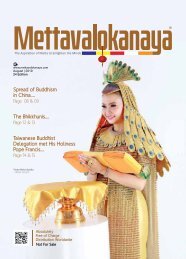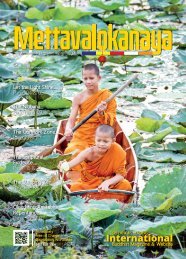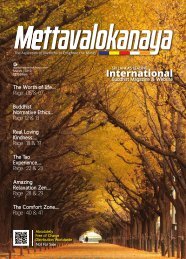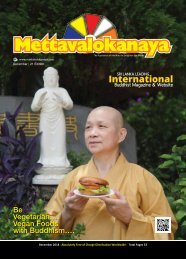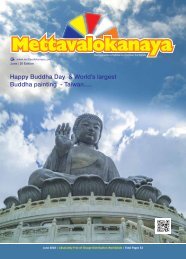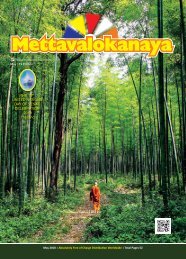mettavalokanaya_buddhist_magazine_january_2021.
This is the Sri Lankan's Most Popular & Leading Monthly International Buddhist Magazine, “Mettavalokanaya” on January - 2021 Edition - 30. “Mettavalokanaya” International Buddhist Magazine has been successfully distributed to 40 countries worldwide. Specially distributed to Overseas High Buddhist Monks, Masters, Nuns, Worldwide famous Buddhist Monasteries & Associations, International Buddhist conferences and Forums. “Mettavalokanaya” International Monthly Buddhist Magazine has been awarded as the “2018 - The Global Buddhist Ambassador Award” from Thailand as the World’s Best and Most popular Buddhist Magazine. The Mettavalokana Buddhist Publications Centre is a registered Buddhist Publications Centre in Sri Lanka and has received many International accolades. Our publications are absolutely free of charge to general public. The magazine comprises of special articles on Buddhism written by leading Buddhist Monks from foreign countries. “Mettavalokanaya” is currently been published in English and includes full color 60 pages.
This is the Sri Lankan's Most Popular & Leading Monthly International Buddhist Magazine, “Mettavalokanaya” on January - 2021 Edition - 30. “Mettavalokanaya” International Buddhist Magazine has been successfully distributed to 40 countries worldwide. Specially distributed to Overseas High Buddhist Monks, Masters, Nuns, Worldwide famous Buddhist Monasteries & Associations, International Buddhist conferences and Forums. “Mettavalokanaya” International Monthly Buddhist Magazine has been awarded as the “2018 - The Global Buddhist Ambassador Award” from Thailand as the World’s Best and Most popular Buddhist Magazine. The Mettavalokana Buddhist Publications Centre is a registered Buddhist Publications Centre in Sri Lanka and has received many International accolades. Our publications are absolutely free of charge to general public. The magazine comprises of special articles on Buddhism written by leading Buddhist Monks from foreign countries. “Mettavalokanaya” is currently been published in English and includes full color 60 pages.
Create successful ePaper yourself
Turn your PDF publications into a flip-book with our unique Google optimized e-Paper software.
The Buddhism
& COVID - 19….
From where does the COVID virus
originate? From which country did
the infection spread? Did animals
infect us, or is there a human
cause? After months of panic, there
is now an ongoing fear of famine and
other catastrophes. Is this Heaven’s way
of punishment? According to Buddhist
scriptures, the human lifespan was
originally 84,000 years, and decreases
by one year every century until it is
diminished to just 10 years, and then
increases by one year every century
until it again attains the peak of 84,000
years – this cycle is known as a Minor
Kalpa. In our world, with the passing of
every kalpa there occurs three lesser
calamities.
A calamity is caused by the
collective karma accumulated by all
sentient beings, and altogether there
are three types of major calamities,
and three lesser types. The three lesser
types include epidemics, famines, and
warfare. An epidemic is a situation
where an individual is infected, and
thus the disease spreads to the family,
the village, the city, the province, and
those who are infected become fatally
ill. Once infected, there is no cure.
Famines can be caused by floods or
droughts. When floods occur, there are
nonstop torrential rains for months, and
inversely, rainless dry seasons can last
for years during droughts. There can
be no harvests under these conditions.
These events have occurred throughout
history – vast oceans have expanded,
or else the earth has dried and cracked,
for thousands of miles. Without food,
death and starvation are inevitable.
These catastrophes are the result greed,
avarice, and the unwillingness to give to
others.
When warfare occurs, opposing
factions do violence against each other,
and the common civilian is defenseless
against this slaughter. This, too, is a
form of karmic retribution. The ancient
adages said, “To predict warfare and
strife, one need only to observe the
happenings at the slaughterhouse.”
The violence that occurs in our world
is primarily caused by our habits of
consumption – therefore Buddhism
instructs us to nurture our compassion
by leading vegetarian lives, and avoid
sowing negative karmic ties with
sentient beings. Everything is the
result of karmic cause and effect –
this is evident from our history! Only
by our cultivation of good deeds,
thus transforming the bad deeds,
can the accumulated negative karma
be absolved. Only then, can sentient
beings live in peace and harmony!
Should your spouse or children be
infected during a pandemic, you should
instruct them to sincerely chant the
name of the Guan Yin Bodhisattva. If
Cultivation
of Good
Deeds
you are capable of chanting the Great
Compassion Mantra and recite it over
water to create great compassion water
for them to drink, then they will surely
recover from their illness. If you do not
know the Great Compassion Mantra, in
place of it, you can recite the name of
‘Namo Great Compassion Bodhisattva
who alleviates suffering and calamity’
ten thousand times over a bowl of clean
water. If you chant this often, then
omitting ‘who alleviates suffering and
calamity’ and reciting only ‘Namo great
compassion Guan Yin Bodhisattva’ is
also acceptable.
All incurable illnesses borne from
negative karmic ties, and malevolent
activity of ghosts and spirits, can be
extinguished by the recitation of Guan
Yin Bodhisattva’s name. All threats from
warfare and violence, or vicious men
and beasts, can be assuaged by the
recitation of Guan Yin’s name. However,
those who are insincere in their
chanting, or doubtful in their belief,
or bad faith in their intent, will see no
effects.
Canada
Most Venerable
Master Tze Cheng
14 l Mettavalokanaya l January l 2021 2021 l January l Mettavalokanaya l 15











